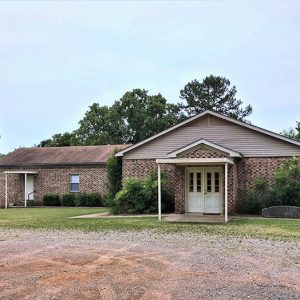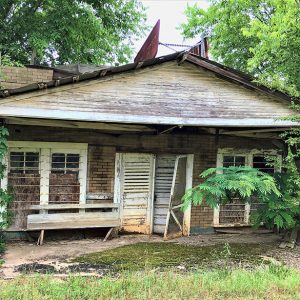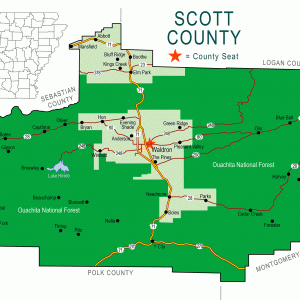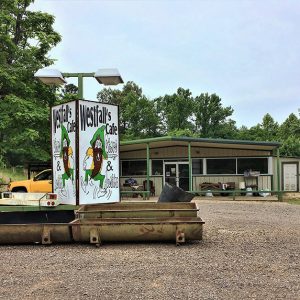calsfoundation@cals.org
Bates (Scott County)
Bates is an unincorporated community in western Scott County. It is located along Highway 28 west, between the junction of Shadley Creek and East Shadley Creek just north of the Poteau River. Bates was established in 1907 and named after the Bates family who settled in the area. Agriculture, timber, and coal mining have historically been important industries in Bates.
Prior to European exploration, Bates was a wilderness lush with native vegetation and numerous species of wildlife, some of which no longer inhabit the area. Early inhabitants of the area were present during the Woodland, Archaic, and Mississippian periods. There are numerous archaeological sites located along the Poteau River south of Bates. This evidence indicates that the people of the Caddo tribe lived along major waterways near Bates.
During the late seventeenth and early eighteenth centuries, French hunters and tradesmen traveled west from the Arkansas Post. These Frenchmen often traversed rivers and streams throughout the region. Several rivers that flow through Scott County were likely named by these French explorers, including the Petit Jean, Poteau, and Fourche La Fave rivers. It is probable that they traveled through the area near present-day Bates.
Early settlers began arriving in the area near Bates in the late 1820s and early 1830s. Most families participated in a wide variety of agricultural practices. In the 1840s, Thompson G. Bates Sr. and his family settled along Jones Creek south of present-day Bates. It was reported that Thompson Bates Sr. owned two slaves, Doc and Henry, who were eventually freed by Bates. Doc later married a woman named Jennie and settled near the town of Bates. Henry was supposedly given land in Bates.
Men who were called to fight in the Civil War served with both the Confederacy and Union. The women and elderly were left at home to look after family homes and farms.
Local legend tells of early settlers in Denton (Scott County) capturing a wolf and tying a bell around its neck. Supposedly the wolf was later heard running throughout the forest near Bates.
In addition to agriculture, mining was an important industry in Bates. Veins of coal were discovered at the base of Poteau Mountain north of Bates. Waldron (Scott County) resident Dimple Johnson claimed that her grandfather dug coal from a family mine called “Pigeon Hole” during the early 1860s.
During Reconstruction, Scott County went through a period of violence. Former slave Doc Bates and his wife Jennie, who lived in the Poteau River valley near Bates, were murdered in the mid-1870s.
The coal mining and agriculture industries continued to provide economic benefits to citizens in Bates during the late nineteenth century.
In 1901, the Arkansas Western Railroad, a subsidiary of the Kansas City Southern, built a 31.7-mile line east from Heavener, Oklahoma, to Waldron in order to service the timber industry. Bates was one of several towns located along the route. The first depot to be built along the route was located ten miles east of Heavener near Bates. The train depot was named Godman, after the president of the railroad. After the railroad was constructed, poor working conditions allowed several accidents to occur. J. C. Davis of Bates was killed in one of the first serious accidents along the Arkansas Western Railway.
In 1902, the Bates Post Office was established, with Thomas Golden as the first postmaster. The town of Bates was officially established five years later in 1907. That same year, the Bates School District was established when it was consolidated with Coaldale School District. There were seventy-seven students enrolled in Bates School during the first year. By 1907, Bates had received a telephone line exchange with the Waldron Telephone Company. By the early twentieth century, Bates had grown to include several stores, a blacksmith, and a sawmill.
During the Great Depression, many farmers in Bates suffered from economic distress. Cotton had dropped from forty cents per pound to five cents. According to reports, a group of Klansmen marched into a religious congregation in Bates and complimented the minister on his work in the community during the Depression. They then made a large contribution and left in their automobiles.
In 1936, an explosion occurred at one of the coal mines in Bates, killing Bill Goesky, John Delay, Joe Taylor, and Tome Ellis. Despite the deaths of these four workers, mining operations continued. During the 1940s, several immigrants moved to the area near Bates to work in the coal mines. Another explosion at a Bates coal mine on August 27, 1940, killed ten men, including Gilbert Johnson and Earl Renfro from Bates.
Several citizens of Bates were drafted into the armed services during World War II.
The Bates School was consolidated with the Waldron School District between the years 1949 and 1953. It was during this time that the town of Bates began to decline in population.
In 1974, the Bates Post Office was converted to a community post office for Waldron. The Bates School House began serving as a community center, voting site, and event center. The old Bates Store was purchased and renamed Westfalls Café Store and Auction. The Hargrove store building still remains standing in Bates in the twenty-first century, although the store closed. The Bates Baptist Church, Bates Assembly of God, and Pentecostal Church of God are active with thriving congregations. The Bates Volunteer Fire Department serves the community.
For additional information:
Cate, Michael. History of Scott County, Arkansas. Dallas, TX: Curtis Media Corporation, 1991.
Echoes: The Scott County Historical and Genealogical Society Quarterly. Waldron, AR: Scott County Historical and Genealogical Society (1986–).
Goodner, Charles. Scott County in Retrospect. Mansfield, AR: Frank Boyd, 1976.
Goodner, Norman. A History of Scott County, Arkansas. Siloam Springs, AR: Bar D Press, 1941.
McCutcheon, Henry Grady. History of Scott County, Arkansas. Little Rock: H. G. Pugh and Company, 1922.
Ty Richardson
Richardson Preservation Consulting











I would like to learn more about the Hargrove Store. Mr. Hargrove was my great-uncle. A. P. Ellis raised his family in Bates and my father Emmett Winslow Ellis drove a truck from age thirteen to make deliveries from the store. His father went by A. P. Ellis